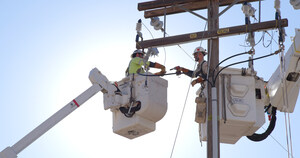
SAN DIEGO, Nov. 22, 2013 /PRNewswire/ -- San Diego Gas & Electric (SDG&E) is reporting that nearly 190 natural gas lines were damaged by third-party contractors or residents through September of 2013, a significant increase from the same time period in 2012. Calling 811 or Underground Service Alert will help avoid possible injury or damage to hidden gas lines or service interruption.
"Damaging a natural gas line can pose a significant safety risk and disrupt natural gas service," said Jimmie Cho, vice president of field services at SDG&E. "We ask everyone – whether digging at their businesses or homes -- to make the quick 811 phone call to Underground Service Alert to have utility-owned lines marked for free."
Before digging in their yard, place of business or the street, residents and business owners should mark the proposed excavation area, and call 811 at least two business days before the project is to begin. Underground Service Alert will contact all local utilities for free to then locate and mark the underground lines, pipes and cables they own. For more information about safe digging or to submit an online request, visit digalert.org.
SDG&E-owned pipelines typically extend from the gas main, in front or behind the home or business, to the gas meter. Customer-owned gas pipes are the lines that run from the gas meter to the building or area where gas-fueled equipment or appliances are located, such as a natural gas barbeque. To have these customer-owned lines located and marked before a project, SDG&E advises its customers to call pipe and leak locating service companies or licensed plumbing contractors who provide these services.
If you suspect a gas emergency, or have questions regarding a gas odor or carbon monoxide, please call SDG&E immediately at (800) 411-7343. It's important to keep in mind that natural gas is flammable and that something as simple as a spark can serve as an ignition source. Use your sense of sight, hearing and smell and any of the following signs to alert you to the presence of a gas leak:
Look
- Dirt or water being blown in the air.
- Dead or dying vegetation (in an otherwise moist area) over or near pipeline areas.
- A fire or explosion near a pipeline.
- Exposed pipeline after an earthquake, fire, flood or other disaster.
Listen
- An unusual sound, such as a hissing, whistling or roaring sound near a pipeline.
Smell
- The distinctive odor of natural gas.
- However, although we add a distinctive odor to natural gas to aid in the detection of leaks, you should not rely on your sense of smell alone to determine if you have a gas leak.
For more safety information, visit sdge.com/safety. You can also call SDG&E at (800) 411-7343. To find out the approximate location of major transmission gas and liquid pipelines, visit the National Pipeline Mapping System website at npms.phmsa.dot.gov/.
SDG&E is a regulated public utility that provides safe and reliable energy service to 3.4 million consumers through 1.4 million electric meters and 861,000 natural gas meters in San Diego and southern Orange counties. The utility's area spans 4,100 square miles. SDG&E is committed to creating ways to help customers save energy and money every day. SDG&E is a subsidiary of Sempra Energy (NYSE: SRE), a Fortune 500 energy services holding company based in San Diego. Connect with SDG&E's Customer Contact Center at (800) 411-7343, on Twitter (@SDGE) and Facebook.
(Logo: http://photos.prnewswire.com/prnh/20110106/MM26476LOGO)
SOURCE San Diego Gas & Electric (SDG&E)







Share this article